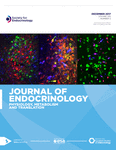Thyroid hormone enhances dendritic cell maturation and function. In dendritic cells, T3 enters the cell via TH transporters MCT10 or LAT2 and binds to cytoplasmic TRβ1 (Gigena et al. 2015 abstract 475, presented at the International Thyroid Congress). Upon binding of T3, TRβ1 translocates from the cytoplasm to the nucleus (Mascanfroni et al. 2008, 2010). T3 binding to TRβ1 also activates cytoplasmic NFκB by initiating degradation of IκB so that NFκB can translocate to the nucleus and regulate gene transcription, including induction of TRβ1 transcription, which is an NFκB target gene, thus forming a regulatory feedback loop controlling TRβ1 levels (Mascanfroni et al. 2008). Furthermore, binding of T3 to cytoplasmic TRβ1 activates the Akt pathway, leading to a nuclear shift of phosphorylated Akt and increased chemokine (C–C motif) receptor type 7 (CCR7) expression, which prolongs cell viability and augments cell migration towards lymph nodes (Mascanfroni et al. 2010, Alamino et al. 2015). T3 stimulation of DCs shifts the cells towards a more pro-inflammatory phenotype through induction of cell maturation, increased IL-12 production, improved antigen cross presentation and an enhanced ability to stimulate a cytotoxic T-cell response and trigger antigen-specific responses in vivo (Mascanfroni et al. 2008, 2010, Alamino et al. 2015, 2016).
- Review
(Downloading may take up to 30 seconds. If the slide opens in your browser, select File -> Save As to save it.)
Click on image to view larger version.
Figure 4
This Article
-
J Endocrinol February 1, 2017 vol. 232 no. 2 R67-R81
Most
-
Viewed
- DHEA deficiency syndrome: a new term for old age?
- METABOLIC PHENOTYPING GUIDELINES: Assessing glucose homeostasis in rodent models
- Post-transcriptional gene regulatory mechanisms in eukaryotes: an overview
- Chronic inflammation exacerbates glucose metabolism disorders in C57BL/6J mice fed with high-fat diet
- Role of the agouti gene in obesity
-
Cited
- Glucagon-like peptide-1(7-36)amide and glucose-dependent insulinotropic polypeptide secretion in response to nutrient ingestion in man: acute post-prandial and 24-h secretion patterns
- Peroxisome proliferator-activated receptors in inflammation control
- The CCN family: a new stimulus package
- The role of corticotropin-releasing factor in depression and anxiety disorders
- Post-transcriptional gene regulatory mechanisms in eukaryotes: an overview











